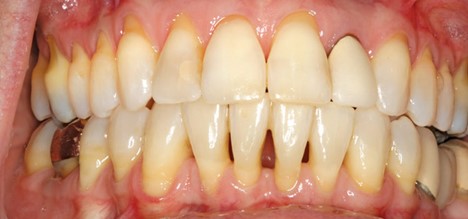Spokane Dental’s Guide to Gum Recession: Causes, Symptoms, and Treatments

Welcome back to Spokane Dental’s blog- where we share ways to enhance your dental health outside of our clinic walls. Today, we're diving into a topic that often flies under the radar but can have a significant impact on your smile and overall oral health – gum recession. Whether you've noticed your gums pulling back or you're curious about prevention, this guide will cover the causes, symptoms, and treatment options for gum recession.
What Is Gum Recession?
Gum recession occurs when the soft gum tissue surrounding your teeth pulls back (or “recedes”), exposing more of the tooth enamel or the root surface, which is much more sensitive. If gum recession is left untreated, the supporting bone, gums, and ligaments of the teeth can be severely damaged, potentially leading to tooth loss.
Causes of Gum Recession
Gum recession can result from a variety of factors. Understanding these can help you take preventive measures:
1. Periodontal Disease: Periodontal disease is inflammation of the gums and bone surrounding the teeth. It is the leading cause of gum recession. Bacterial gum infections destroy gum tissue and the bone that supports your teeth. Early signs of periodontal disease such as bleeding or inflamed gums (known as gingivitis) are reversible, but one the inflammatory disease affects the bone surrounding the tooth, the damage can be irreversible.
2. Brushing Too Hard: While brushing twice a day is crucial, using a hard-bristled toothbrush or brushing too aggressively can wear down your enamel and cause your gums to recede. Opt for soft or extra soft bristles and use a gentle touch- about ½ lb. of pressure is all you need!
3. Poor Oral Hygiene: Failing to maintain a proper oral hygiene routine allows plaque to harden over time into calculus buildup, which causes an inflammatory response in the gums around it. Calculus is a hard substance (think cement on the teeth) that can only be removed by a professional dental cleaning, which our experienced team of hygienists can do for you!
4. Genetics: While genetics can be a risk factor for periodontal disease and gum recession, a genetic predisposition does not automatically mean your gums will suffer the same fate as your parents or family members. If periodontal disease runs in your family, let us know at your next appointment and our team can factor in extra precaution in a treatment plan to keep your gums healthy.
5. Hormonal Changes: Women are particularly susceptible to gum recession during hormonal changes, such as puberty, pregnancy, and menopause. These hormonal fluctuations can make gums more easily inflamed and prone to recession.
6. Smoking: Smoking or using tobacco products contributes to gum recession. Plaque and calculus build up more quickly, inflammatory levels are higher, and proper blood flow is restricted, all of which can greatly affect gum health.
7. Misaligned Teeth or Grinding: Misaligned teeth or an improper bite can place extra force on the gums and bone as well as create hard-to-clean areas cause the teeth to loosen and compromise the gums.
Symptoms of Gum Recession
Gum recession is often a gradual process, so it’s important to recognize the symptoms early:
- Sensitive Teeth: If you notice increased sensitivity to hot, cold, or sweet foods, it might be due to exposed tooth roots, which are much more sensitive to stimuli.
- Visible Roots: As gums recede, the roots of your teeth become visible.
- Longer Teeth: Your teeth may appear longer than usual, giving your smile an uneven look.
- Gum Inflammation: Red, swollen, or bleeding gums can indicate gum disease, which is a precursor to gum recession.
- Bad Breath: Persistent bad breath or a bad taste in your mouth can be a sign of gum disease and recession.
Treatment Options for Gum Recession
If you suspect you have gum recession, we are here to help! There are several effective treatments available either in our clinic or with a treatment plan for referral:
1. Deep Cleaning (Scaling and Root Planing): This “deep-cleaning” procedure removes plaque and tartar from below the gumline and smooths the root surfaces. Our hygieniests clean either a quadrant or half of the mouth at a time, which lessens inflammation and allows the gums to heal.
2. Gum Grafting: In this surgical procedure, tissue is taken from another part of your mouth or a donor source and attached to the affected area. This can help restore the gumline and protect your teeth.
3. Desensitizing Agents: To manage sensitivity, Dr. Smith may recommend or prescribe toothpaste or treatments that can help reduce the discomfort associated with exposed roots.
4. Orthodontics: If misaligned teeth or bite issues are contributing to your gum recession, orthodontic treatments like braces or Invisalign can help correct these problems.
5. Lifestyle Changes: Improving your oral hygiene routine, switching to a soft-bristled toothbrush, quitting smoking, and managing teeth grinding can all prevent further recession.
Prevention is Key
At Spokane Dental, we emphasize prevention to all of our patients through our outstanding care and patient education. Preventing gum recession is always better than treating it. Here are some preventive tips to keep your gums healthy:
- Brush gently with a soft-bristled toothbrush.
- Floss daily to remove plaque between your teeth and gums.
- Use an antiseptic mouthwash to reduce bacteria.
- Visit Spokane Dental regularly for check-ups and professional cleanings.
- Wear a mouthguard if you grind your teeth at night.
- Maintain a healthy diet to support your overall and oral health.
Gum recession might sound daunting, but with proper care and timely treatment, you can protect your smile and keep your gums healthy. If you have any concerns or notice symptoms of gum recession, don't hesitate to schedule an appointment with Spokane Dental at (509) 822-5614. We’re here to help you achieve and maintain a healthy, confident smile!
Photo Credit:

